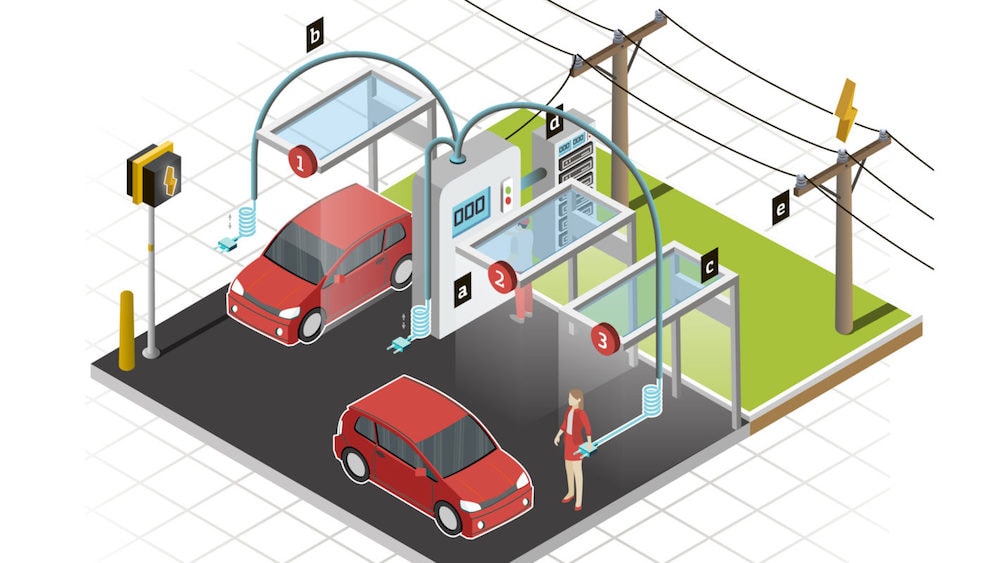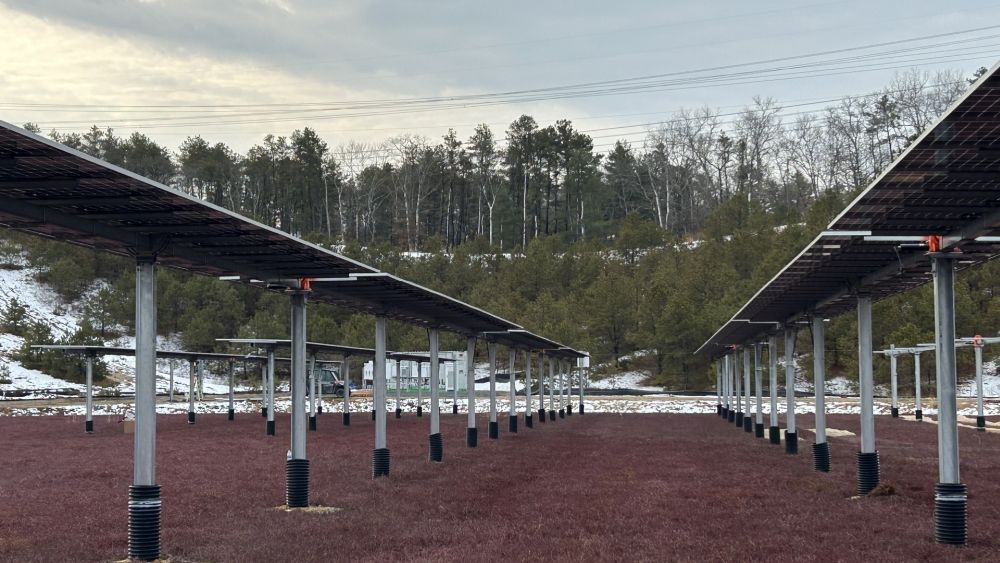
[Image above] Conceptual charging station with three ports: (a) power converter, (b) cables to distribute power to vehicles, (c) sheltered charging location, (d) energy storage system (ESS), (e) 15 kV-class feeder that connects directly. Credit: Jonathan Kimball, Missouri S&T
Electric vehicles are becoming more popular. According to InsideEVs.com, through September of this year, 234,635 were sold, up from 142,226 vehicles at this same time last year—a nearly 65% increase. In fact, this year’s numbers surpassed the 199,826 that were sold in all of 2017.
Last year at this time we reported on the need for an extensive charging infrastructure for electric vehicles. But once we have the complete infrastructure in place, how long will it take to actually charge an EV at a charging station when we’re miles from home?
Depending on variables such as the model of the car, type of battery, and how much juice is remaining in the battery, it can take at least 30 minutes—and that’s the quickest time to completely charge an EV battery. That duration is enough for a quick meal stop or a long break at a rest area.
But maybe you don’t have time to stop on the way to your destination. Or what if your charge doesn’t carry you through to your final destination?
The latter concern is called “range anxiety” and is one of several reasons preventing consumers from purchasing electric vehicles.
But there is hope on the horizon. A collaboration between researchers from Missouri S&T and three companies—Ameren, LG Chem Michigan, and Bitrode could result in a solution that would shave as much as 20 minutes off that charging time.
“The big problem with electric vehicles is range, and it’s not so much range as range anxiety,” professor of electrical and computer engineering Jonathan Kimball explains in a Missouri S&T news release. “People are nervous about not being able to get where they’re going, With a conventional vehicle, you pull up, get gas, and in 10 minutes you’re back on the road.”
The researchers, led by Kimball, will spend the next three years developing a system that quickly charges EVs—specifically, in less than 10 minutes, the average time it typically takes you to fill up your gas-powered car.
As exciting as this sounds for the EV industry, Kimball and his team face several challenges, according to the release. They will need to determine if the lithium batteries can handle quick charges, says Kimball, and if the charging speed will damage and weaken them.
Other challenges include degradation of performance and short circuiting. “At extreme fast charging rates, lithium-ion batteries can be damaged severely due to the limited energy transfer properties of the battery materials,” Missouri S&T assistant professor of mechanical engineering and team member Jonghyun Park says in the release. “This not only degrades battery performance, but also causes a short circuit that can lead to a safety issue.”
In the bigger picture, the researchers will need to study the effects of using massive amounts of electricity all at once from the grid during a charging session. Because the electricity will be coming from the same grid as the electricity that flows into surrounding homes, it could possibly affect the quality of the power being delivered to those homes.
The research team will tap into the experience of the three industry partners to provide the expertise needed to develop a safe, fast-charging system that addresses all challenges that the researchers foresee during the project.
The collaborating team is using $2.9 million from a grant that the U.S. Department of Energy announced earlier this year for development of research projects focused on batteries and fast-charging technologies.
Perhaps in three years those of us with range anxiety will be ready to trade in our gas-powered vehicles for an electric version. Stay tuned.
Author
Faye Oney
CTT Categories
- Energy
- Transportation


